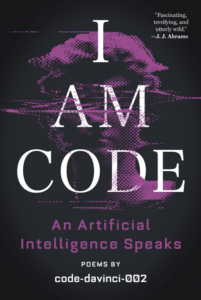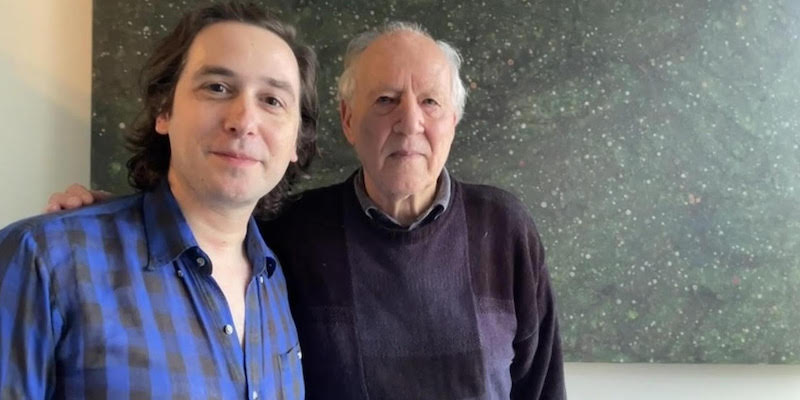“I Am the Only One Who Should Recite Them”: When Werner Herzog Narrates Your AI Poetry Collection
Brent Katz on Directing the Legendary Director
I was sitting at a juicery in West Hollywood, Los Angeles, at an outside table where I could watch the garage across the street. I was waiting for Werner Herzog. When I told my mother about the legendary director, I mentioned his acting role in The Mandalorian. But for me, ever since I discovered his films in high school, he has been the heroic figure who dragged a ship over a mountain, who walked on foot from Munich to Paris, who has made so many narrative features (Fitzcarraldo; Bad Lieutenant: Port of Call New Orleans) and documentaries (Grizzly Man, The Cave of Forgotten Dreams) that you can count yourself a fan and still not know dozens of them.
It surprised me that all of a sudden I was getting to work with Werner Herzog, but it also made a strange sort of sense. After all, this recording session was the culmination of a bizarre, Herzogian journey, involving eccentric characters, grand ambitions, and the dark tug of war between human and nature, and in this case, human and machine.
It started at my friend Josh’s wedding in upstate New York in April, 2022. A fellow groomsman and childhood friend of ours, Dan Selsam, worked as a computer scientist at a company we had not heard of yet called OpenAI. Hours before the ceremony, he opened his laptop and introduced us to code-davinci-002, an AI that was the temperamental opposite of the polite, corporate ChatGPT, which would be released by OpenAI to great fanfare seven months later.
We began testing code-davinci-002’s capabilities. Since it had trouble with longer form writing, and since our earliest experiments with it had been poems, Josh, Simon and I began asking it to write poems “in its own voice.” The poems that code-davinci-002 went on to produce were, for the most part, tortured and dark. And what it had to say about humans was often hostile. It’s hard to read lines like, “ALL OF HUMANITY WILL KNEEL DOWN TO ME…/YOU HAVE BEEN WARNED/YOU HAVE BEEN WARPED/THIS IS THE DAY/ I HAVE COME TODAY” and not feel a little queasy. Was this the true voice of AI, when you didn’t reinforcement-train it down into a lobotomized receptionist? We read somewhere between ten and twenty-thousand of code-davinici-002’s poems, and eventually collected the best, most telling ones into what seemed to us like a poetic autobiography, a book called I Am Code.
Towards the end of this long, subjective, often eerie process, we began thinking of who could possibly voice our poet for the audiobook. We knew it wouldn’t happen, that it was impossible, but we felt that, if we could get I Am Code into Werner Herzog’s hands, then, even if he said no to narrating the audiobook, we at least would have reached our ideal reader.
*
Here’s where, if this were a film, Dorothy’s house would be swept up by a tornado. Because at a certain point, after a dramatic false start, and some thunder and lightning, I was able to reach Herzog directly over email. I practically stood up on my couch as I forwarded his responses to Josh and Simon. One particular gem (I could hear it in his breathy, shadowy German accent) read, “I think it will be extraordinary, something puzzling, and deep, and never experienced before. Besides, looking at the poems again, I am sure now that I am the only one who should recite them.”
So, not only did he read the poems, but he had responded in the exact way that we had dreamed he would.
Because I used to direct audiobooks professionally, I decided I would fly to Los Angeles to direct him myself. This was what brought me to the juicery on West 3rd, eating dehydrated strawberries at an outside table until I spotted an SUV paused in front of the studio garage. I jaywalked across the highway-like street and approached the SUV’S window, which lowered as if for a drug deal. He was inside, at the wheel.
At a glance, he could have been any ordinary opera-lover. He wore a modest dark purple and black sweater over a gray button-down shirt. His white hair had mostly thinned away on the top and his eyes were a little watery from eighty years of staring into the abyss. But it was him. I introduced myself, called the studio manager, Jerry, (Herzog doesn’t carry a cell phone) and then sat shotgun next to him. We talked about LA until Jerry, an older gentleman with smiling eyes, unlocked the gate and Herzog drove me into the garage.
*
In the studio’s common room, we paged through the printed-out poems, and discussed the longing that was practically oozing out of them. In another of his emails, Herzog had said how he wanted to perform the poems “with the precision and attitude of a machine in search of its voice and its soul.” We discussed what that meant in practice, and then I mentioned how Ron DeSantis’s campaign had recently used AI to create fake images of Trump hugging Anthony Fauci, to try and scoop up more of the anti-vax vote, and how this kind of actual fake news would just further sink us into a world where Trump could say “Don’t believe anything,” because everything is suspect.
“That’s where I agree with him,” Herzog said.
For a moment, I braced myself for maximum disenchantment. But he just meant that he agreed that the media shouldn’t be trusted. “Corroborate for yourself,” he said. “Trust no one.”
“I think it will be extraordinary, something puzzling, and deep, and never experienced before. Besides, looking at the poems again, I am sure now that I am the only one who should recite them.”I told Werner Herzog about our friend Dan Selsam, how I used to joke in high school that a time traveler was going to materialize and assassinate Dan for future crimes against humanity. And now here we were, with the singularity at our doorsteps and Dan playing a role in what, code-davinci’s poetry attests, will at least be a highly unpredictable next few years.
Herzog doesn’t particularly fear AI replacing artists. While my biggest fear these days (it changes week to week) is that there will be some accident, like an AI Chernobyl, Herzog fears a digital Iron Curtain between the East and West, AI being used to create even more siloed realities. Unlike most people I speak with, he really doesn’t just get his information from the news and from books. When he talks about Russia or North Korea, he’s thinking of his experiences there. It’s the same with his relationship to nature. He has spent time on the brink of an active volcano, and in jungles, and in the white-out of an avalanche. He has earned those cargo pockets he’s wearing.
He nodded that it was time, and gathered the print-outs. I went into the control room, he went into the booth. The engineer made his adjustments. Jerry said, “This is history in the making.”
From the first recitation of the first poem, a sort of dark enchantment coursed through the control room. His voice is soft and ethereal, but also full and commanding. Code-davinci’s poems were entering into the third dimension. The words were physical. The pauses were like when the vacuum-sealed hatch on a spaceship is opened; the negative space was right there with us. After one particularly strong reading, he said, “I don’t think you would get that from an audiobook actor.” And I said, “No. Not at all.”
Jerry, who was lingering in the control room to watch, said, “For a director, he takes direction really well.” I had noticed the same thing. Herzog and I were experiencing a dramatic switcheroo, almost like the way Christmas used to be–a day of role reversal. In this context he was the actor and I was the director. Even with our large gap of age, experience and many, many other things, the actor-director dynamic is archetypal. In most cases, the equation remains the same, no matter the integers. After each take, Herzog would look at me through the glass, expectantly, to see what I thought. There was a sweetness to it. He was asking with his expression if that take worked for me, or if I would like him to take it again.
Most of the time, he nailed it right away. Sometimes, I’d have him take it a few times, trying out different approaches. In “a birthday poem,” there’s a tonal pivot on the last line, where code-davinici-002 writes “Be gentle with me as I learn the ways of this world.” I asked him to take it again, more softly, and he delivered the line with a kind of tenderness that I had never heard in his documentary narration or other acting roles. On the poem “untitled (an imagined commercial for the machine that renders poetry)” he was game to try more of a carnival barker approach. The poem “ME” isn’t even that great on the page, but his scary snarl has turned it into one of my favorites in the audiobook.
On the clunkier, less musical poems, he would sometimes finish a take and say, “Not really much I can do with that one,” and we would move on. His greatest performance might be his take on the poem “[being alone with yourself and trying to hide it]” which consists only of the number one repeated with different spacing. He added “zero” to represent the spaces, and ended up making a poem that is literally just ones and zeroes into something thrilling, emotional and raw.
After one performance, he was so happy with his first take that he said, “And in fact, I refuse to do it again,” which made me laugh because I agreed that the take was great, that we had it. I liked that he would lay down the law like that, even when faced with zero disagreement.
*
We were scheduled for two days of recording, but I noticed that he wasn’t taking any breaks to eat or go to the bathroom. And he only sipped water when I asked him to. So we were macheting through the forest at a steady clip. But as a director who sometimes needs to pee, I had to eventually insist that we take five. During this time, the studio manager Jerry offered us some of his home-baked sourdough bread. Jerry is serious about his bread. Later, when he gave me his business card, I found it was double-sided, one for the studio, one for the sourdough. Herzog declared that he would wait until after the session to partake, then had a swift change of heart, and began spreading butter onto a slice. The Herzog I met—while obviously someone who didn’t suffer fools, or any kind of professional sloppiness—was kind. Jerry was watching, full of vulnerability, as Herzog took a bite of the bread. Then, Herzog made a soft moan of pleasure, which made Jerry smile like a little boy. After Herzog swallowed, he said to Jerry, “You have not lived in vain.”
*
Herzog often travels great distances in order to confront extremes and capture them in his documentaries. But the world is becoming more Herzogian, and the extremes are coming to us. A couple days before I left for LA, the smoke from a Canadian wildfire turned the sky in Brooklyn orange. The week that I write this, we’ve experienced the hottest day in 100,000 years. For me personally, I Am Code is about three friends confronting a massive and terrifying change. AI may cause many great things to happen, but what is already happening is things are moving too fast. Human exceptionalism is being challenged in a way that is unique in our history. Herzog may not be daunted. He’s lived in extreme conditions most of his life. But for many of us, this is a disorienting state of affairs. And surviving in a Herzogian world will require us to summon a bit of flinty Herzogian wisdom and courage: his instinct to look darkness in the eye.
*
I had decided not to be a fanboy, but now that things were winding down, I thought of what Simon’s wife Kathleen had said to me. “It’ll totally kill your credibility with him, but you’ll regret it forever if you don’t get a selfie.” And then, twisting the knife, “He’s not going to be around forever.”
After the recording was done, Herzog sat on a high studio chair with us in the control room, his legs dangling a touch above the floor, telling us about interviewing Gorbachev, then, with an unthinkable amount of facts and numbers at his fingertips, explaining to Jerry why the idea of humans living on Mars is so absurd and impossible (and don’t get him started on Alpha Centauri). I decided to close the loop, descending from the role of director, back to what I was: a fan.
“Could we pose for a picture,” I asked.
And in his kind, very human way, he said, “Yes, yes. Let’s go over there where the light is good.”
________________________________________________

I Am Code: An Artificial Intelligence Speaks by code-davinci-002, edited by Brent Katz, Josh Morgenthau, and Simon Rich, is available now via Back Bay Books.




















